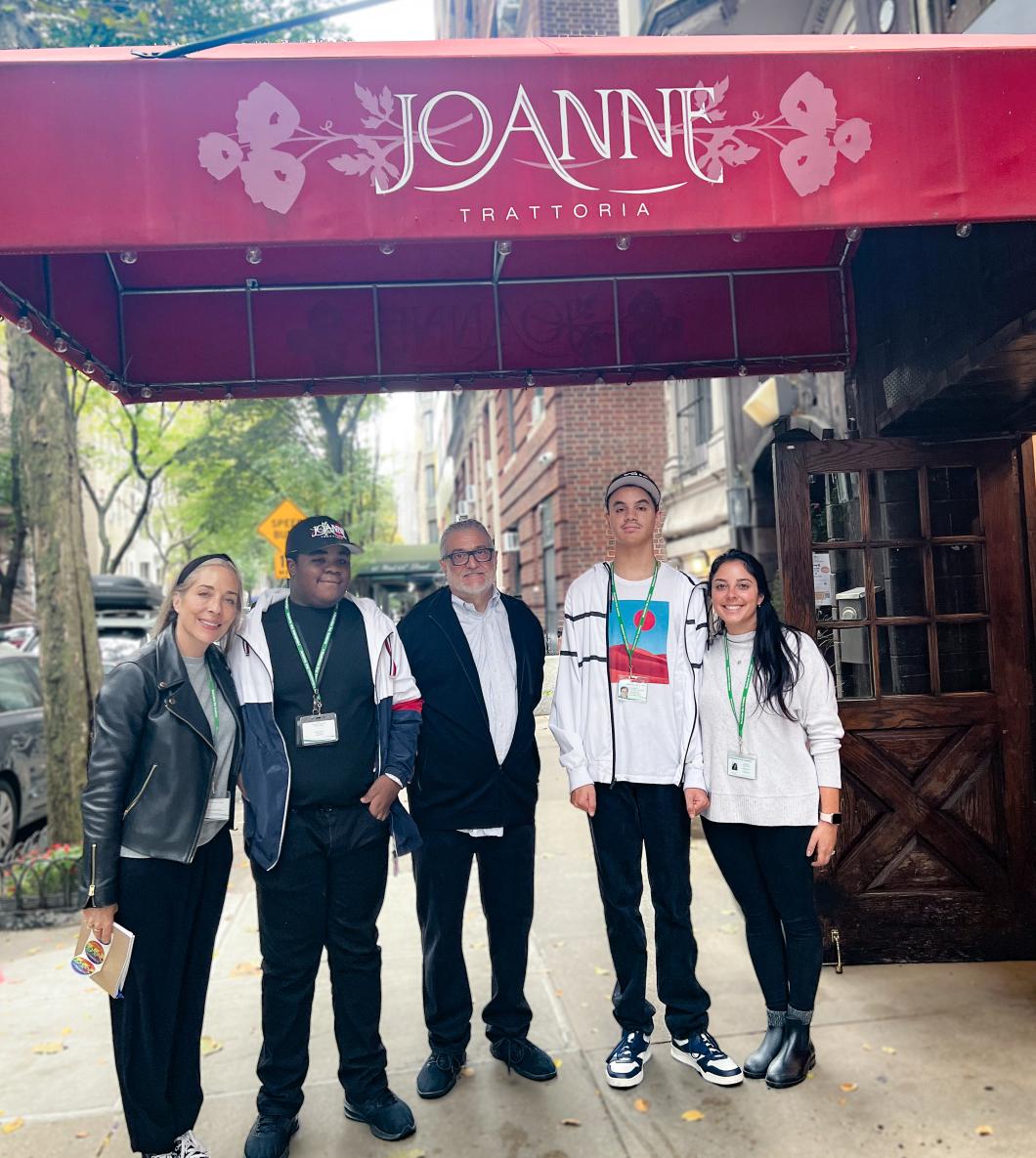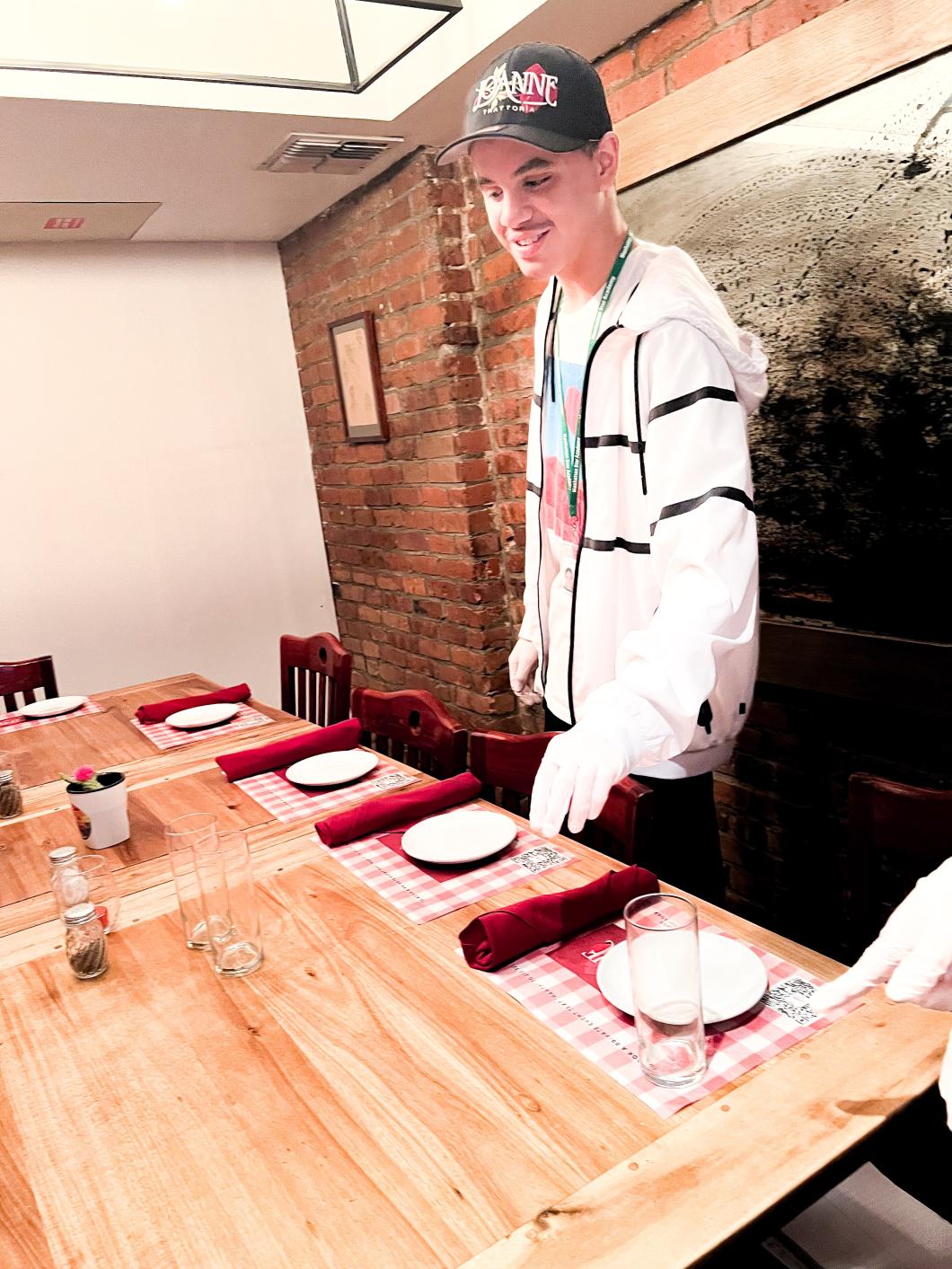Dahaba, Jalil, and Jordan wear matching black hats with the words “Joanne Trattoria” on them and bundle up to brave a chilly, rainy January morning. They begin the six-minute walk from their school on Manhattan’s Upper West Side to the famous eatery.

Once there, they eagerly spread out for their game plan. They want to ensure that the restaurant is ready when it opens at 11:30 am. Dahaba tackles the front of the house where the bar is located, putting down placemats and utensils. Jordan takes the main dining room and sets clean glasses on the tables while scanning to see what is missing. “Salt and pepper, table needs it,” he says. Jalil moves to the outdoor patio to arrange white plates and silverware wrapped in red napkins. “Utensils go opposite side of seats,” he says aloud during his pep talk to himself. Together they work swiftly and efficiently to finish setting up within the hour. The staff is pleased and remind them same time, same place next week.
The teenagers are part of a pilot program started last fall at Manhattan Star Academy (MSA), a YAI affiliate that serves students ages 3-21 who have a broad range of intellectual and developmental disabilities (I/DD). Known as the Transition Program, the in-house and community-based internships give students opportunities to explore potential employment interests. In return, local businesses like Joanne Trattoria gain hardworking volunteers who can assist with tasks such as stocking shelves, greeting customers, ushering, cleaning, setting tables, and more. In addition, internships like these address the unemployment rate among young people in the country that continue to lag behind their neurotypical peers. In 2022, 14.5% of 20–24-year-olds with disabilities were unemployed, more than double the unemployment rate as those in the same age group with no disability.
“I have seen Jordan come out of his shell since the internship started. He seems happier and even willing to do more chores at home,” said Yelitza Leon, Jordan’s mother. “His communication has improved, and he seems less anxious and more confident in social settings. I get the sense that he feels useful and welcomed in the community.”
According to research from Cornell University, employers who offer internships to people with disabilities are 5.7 times more likely to hire a person with a disability on a more permanent basis compared to those who do not. Furthermore, hiring people with disabilities—whether for on-the-job training opportunities or another type of position— allows employers to foster their diversity, inclusion, and accessibility goals and build diverse talent for the future.
“It has been a wonderful experience to watch the students grow from shy, apprehensive youths into confident, eager, and independent young adults,” said Joe Germanotta, Lady Gaga’s father and owner of Joanne Trattoria. “Since the beginning, they have fostered a relationship with me and my staff. They now practice eye contact, address each of us by name, and start their assignments with little instruction.”
Currently 13 students, aged 13-17, have internships every Thursday for an hour. The older students work at Joanne Trattoria while the younger ones have the opportunity to work on life skills during in-school internships which include manning the snack cart, delivering packages throughout the school, and learning maintenance tasks such as restocking toilet paper in the bathrooms and taking out the garbage. Dahaba, 16, also interns at MSA’s Lower School, where he was once a student, as a Junior Teacher’s Aid, providing one-on-one support to different classrooms.
Among other skills, these activities help students practice being punctual, working collaboratively, following a sequence, and staying on task. All skills that will prepare them for when they graduate MSA at 21 and actively work and live in other communities, whether through YAI programs or elsewhere.

“This firsthand experience of working gives them the opportunity to voice what they like and don’t like,” said Lynzee Cohen, Transition Coordinator at MSA. “We as neurotypical adults can choose a field or career that fits our needs, so giving these students the same opportunity to try as many things as possible, as early as possible, allows them to learn and make mistakes in an environment that still provides them the support they need,” said Cohen.
Internships are determined based on each student’s annual Person-Centered Support Plan, put together by staff and the student, who actively takes part in the meeting, voicing their aspirations for the future. During internship placements, staff are available to help and offer advice as students complete their tasks.
“We want the opportunity to build a greater partnership in the community with local businesses – our biggest struggle has been people not understanding our population and the fear they have of hiring people with disabilities,” said Cohen.
A hurdle they hope to overcome by maintaining visibility in the community and advocating to be part of professional spaces to grow students’ independence.
“I have learned that with patience, anyone can be trained a life skill... the students only needed a safe environment, opportunity, and a desire to learn,” said Germanotta.

